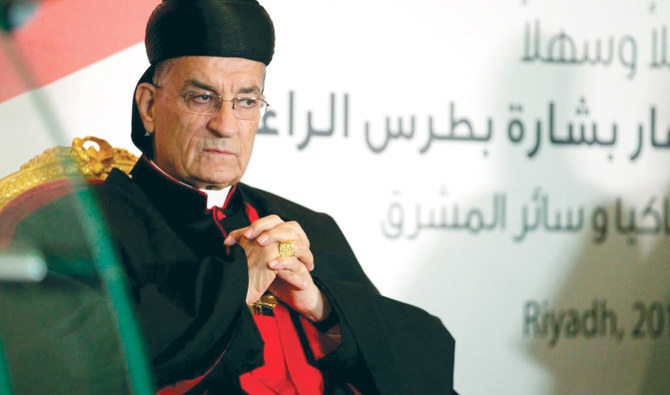
by NAJIA HOUSSARI — arabnews.com — BEIRUT: Lebanon’s leading Christian cleric has intervened in a last-ditch bid to break the stalemate over the formation of a new government in the country, warning that the Lebanese are “hungry and losing hope.” The move by Maronite Patriarch Bechara Boutros Al-Rai follows a series of fruitless meetings between President Michel Aoun and Prime Minister-designate Saad Hariri that have failed to resolve the political impasse despite a mounting economic crisis and appeals from the international community. More than a week has passed since the 13th meeting between the two political rivals with Hariri yet to receive a response from Aoun on the proposed Cabinet lineup of 18 ministers he had submitted.
Al-Rai, the highest spiritual authority in the Maronite community, visited Aoun on Friday, a day after Hariri held talks with the patriarch. The cleric then met with the head of the Free Patriotic Movement (FPM), Gebran Bassil, who faces accusations of obstructing the formation of the government by insisting on naming Christian ministers. Bassil said after the meeting: “When there is an intention to adopt the same standards, the government will be formed.” However, a source close to Hariri told Arab News that the FPM leader “is holding on to the obstructing third in the Cabinet, and this means the government will not be formed in the near future.” Speaking at Baabda Palace, the president’s residence, Al-Rai said that a final understanding between Aoun and Hariri was urgently needed. “The Lebanese people are hungry, unemployed and without hope or confidence. They cannot bear it anymore,” he warned. The senior cleric added: “People in Beirut are suffering as a result of the Aug. 4 (Beirut port) explosion, and this is a fundamental reason for us to have a government — an executive authority that shoulders its responsibilities. It is one of the constitutional institutions that must be in place. We cannot continue with a caretaker government that might last for six months because the country is paralyzed.”
Al-Rai said that the region’s future is “hanging in the balance.” “If there are solutions, Lebanon cannot be absent, and if there are no solutions, Lebanon cannot continue to bind itself to others. If there is war, we must also have a government that knows how to think and act. The door to all institutions is the government. Lebanon cannot live like this while it loses its institutions one after the other,” he said. During their meeting on Thursday Hariri outlined to Al-Rai the circumstances related to forming a new government, saying that the Cabinet lineup suggested to Aoun includes 18 names of non-partisan specialists. “These are people of integrity and competence who are able to carry out the agreed reforms,” he said. Hariri told the patriarch that “the goal is not to form a government as we agree, or for me to be the prime minister. The goal is to stop the collapse and rebuild Beirut. This can only be achieved by undertaking the reforms agreed upon to restore the flow of funds to Lebanon.”
After his meeting with Al-Rai, Bassil said: “The discussion took place against the desire for having a government, and we agreed on all issues and the need to form the government quickly. To this day, we have not set any condition or demand except to deal equally and form the government on the basis of the constitution and national consensus.” Al-Mayadeen TV reported on Thursday that a virtual meeting between Bassil and Hezbollah chief Hassan Nasrallah focused on “developing the existing understanding between the two sides.” Lebanon was pinning its hopes on a scheduled visit by French President Emmanuel Macron next Tuesday to accelerate France’s initiatives regarding the formation of a rescue government. However, Macron’s positive test for coronavirus led to the postponement of the visit and, with it, any hopes for an end to the government crisis in the next two weeks.



